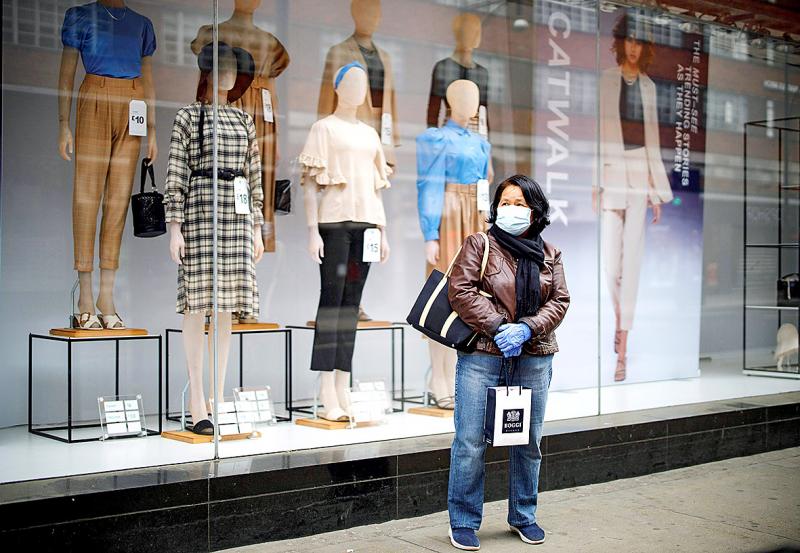Since the appearance of COVID-19, Taiwanese expats living in the United Kingdom have had to face their share of adverse situations.
Racism was the first thing to rear its ugly head, as the new virus has been closely associated with China, and East Asia as a whole, in the collective imagination.
“I was wearing a face mask on my way to do my grocery shopping when a man approached me quietly and shouted ‘virus’ in my face. I was too scared to fight back, so I asked him to leave me alone and hurried to reach my destination. Since then, I have been avoiding going shopping in off-peak times and I do not dare wear a mask when I am alone on the street,” said Liang Min-hsuan (梁敏萱), who is living in London.

Photo: AP
Even finding a face mask of a good standard has nonetheless proven to be difficult in the UK, and scams are plentiful.
“I could find face masks online, but for an expensive price,” said Yu Chi-yi (余治儀), a student at King’s College in London. “I paid £62 (NT$ 2,314) for 10 masks that seemed standard but were actually substandard.”
Since then, she has decided to order face masks directly from Taiwan, despite the cost and delay for the delivery.

Photo: AFP
Similarly, it has become more and more complicated to purchase Taiwanese food in the UK. Liang noticed at the beginning of the lockdown that people were panic buying instant noodles and frozen food in Asian supermarkets in London, so that they were running out of stock.
Yu told the Taipei Times that online Asian shops had also run out of stock, and that delivery times were often very long.
However, some, like Tsai Yun-jui (蔡昀叡), a music teacher in Durham in the north east of England, has been skipping Taiwanese food altogether.
Because he does not have the necessary material at home, Tsai also had to stop offering online lectures at the beginning of the lockdown, and has been furloughed, along with 4 million other workers in the UK.
IMPACT ON STUDENTS
Students have been particularly affected by the spread of the pandemic, as universities in the UK have decided to move their courses online, but Taiwanese students are trying to stay positive nonetheless.
“A substantial amount of the learning material was already online,” said Tsai Zhi-wei (蔡至維), an architecture student. “However, the tutors are overworked as they also need to deal with house chores or to look after their children.”
“Learning at home is a bit awkward and you cannot talk with your classmates, but it also saves time as I do not need to commute everyday anymore,” said Lee Chiung-hsien (李炯憲), a student at Newcastle University.
With more than 161,000 cases and over 21,000 deaths as of press time, the UK is the globe’s fifth most impacted country by the coronavirus.
“I think the UK sprung into action too late. It took the government too long to decide whether to enforce a lockdown or not. It is precisely because of this delay that we have reached the situation where we are now — where COVID is no longer containable,” said Tsai Ting-Yu (蔡亭玉), a Taiwanese doctor in Norwich in the east of England.
A consequence of this delay is that hospitals have been overwhelmed and quickly have run out of supplies, so that the priority has been given to the most serious cases.
“I am worried that if I catch the disease, I won’t be able to get proper treatment in the UK, because they only treat the most severe cases. But it’s too late to fly back to Taiwan anyway,” said Tsai Zhi-wei.
In spite of everything, the situation in the UK is slowly improving. Prime Minister Boris Johnson announced yesterday that there are “real signs that we are passing through the peak,” as hospitals are seeing fewer admissions and fewer COVID-19 patients in intensive care.
“I am glad to see that everything is starting to become more stable and to see people helping each other during this tough time,” said Hsu Chia-yuan (許嘉元), a resident of Colchester in Essex.
With increasing signs that the lockdown will be easing in the near future, these expats hope that their home away from home will soon return to normal.

Google unveiled an artificial intelligence tool Wednesday that its scientists said would help unravel the mysteries of the human genome — and could one day lead to new treatments for diseases. The deep learning model AlphaGenome was hailed by outside researchers as a “breakthrough” that would let scientists study and even simulate the roots of difficult-to-treat genetic diseases. While the first complete map of the human genome in 2003 “gave us the book of life, reading it remained a challenge,” Pushmeet Kohli, vice president of research at Google DeepMind, told journalists. “We have the text,” he said, which is a sequence of

On a harsh winter afternoon last month, 2,000 protesters marched and chanted slogans such as “CCP out” and “Korea for Koreans” in Seoul’s popular Gangnam District. Participants — mostly students — wore caps printed with the Chinese characters for “exterminate communism” (滅共) and held banners reading “Heaven will destroy the Chinese Communist Party” (天滅中共). During the march, Park Jun-young, the leader of the protest organizer “Free University,” a conservative youth movement, who was on a hunger strike, collapsed after delivering a speech in sub-zero temperatures and was later hospitalized. Several protesters shaved their heads at the end of the demonstration. A

Every now and then, even hardcore hikers like to sleep in, leave the heavy gear at home and just enjoy a relaxed half-day stroll in the mountains: no cold, no steep uphills, no pressure to walk a certain distance in a day. In the winter, the mild climate and lower elevations of the forests in Taiwan’s far south offer a number of easy escapes like this. A prime example is the river above Mudan Reservoir (牡丹水庫): with shallow water, gentle current, abundant wildlife and a complete lack of tourists, this walk is accessible to nearly everyone but still feels quite remote.

In August of 1949 American journalist Darrell Berrigan toured occupied Formosa and on Aug. 13 published “Should We Grab Formosa?” in the Saturday Evening Post. Berrigan, cataloguing the numerous horrors of corruption and looting the occupying Republic of China (ROC) was inflicting on the locals, advocated outright annexation of Taiwan by the US. He contended the islanders would welcome that. Berrigan also observed that the islanders were planning another revolt, and wrote of their “island nationalism.” The US position on Taiwan was well known there, and islanders, he said, had told him of US official statements that Taiwan had not